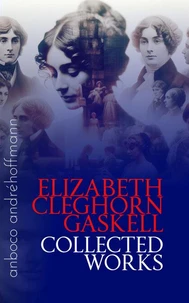Mary Barton. Exploring Class Conflict and Social Realism in 19th - Century Manchester
Par :Formats :
Disponible dans votre compte client Decitre ou Furet du Nord dès validation de votre commande. Le format ePub est :
- Compatible avec une lecture sur My Vivlio (smartphone, tablette, ordinateur)
- Compatible avec une lecture sur liseuses Vivlio
- Pour les liseuses autres que Vivlio, vous devez utiliser le logiciel Adobe Digital Edition. Non compatible avec la lecture sur les liseuses Kindle, Remarkable et Sony
 , qui est-ce ?
, qui est-ce ?Notre partenaire de plateforme de lecture numérique où vous retrouverez l'ensemble de vos ebooks gratuitement
Pour en savoir plus sur nos ebooks, consultez notre aide en ligne ici
- Nombre de pages427
- FormatePub
- ISBN4057664150134
- EAN4057664150134
- Date de parution19/11/2019
- Protection num.Digital Watermarking
- Taille767 Ko
- Infos supplémentairesepub
- ÉditeurGOOD PRESS
Résumé
In 'Mary Barton, ' Elizabeth Cleghorn Gaskell crafts a poignant narrative set against the backdrop of 19th-century industrial Manchester. The novel, rich in its detailed portrayal of the working-class experience, explores themes of poverty, class struggle, and love amidst systemic oppression. Gaskell's evocative prose combines realism with a deep sense of empathy, employing vivid characterizations and social commentary that underscore the harsh realities faced by the laboring class.
The novel serves not only as a compelling story of personal tragedy and social justice but also as a vital historical document, reflecting the socio-economic upheavals of the time. Elizabeth Cleghorn Gaskell, known for her keen social observations and compassion for the underprivileged, was deeply influenced by her own experiences in a industrialized society, as well as her close relationships with workers.
As a social reformer and member of the literary circle surrounding Charles Dickens, Gaskell utilized her writing to advocate for social reform. Her firsthand knowledge of the struggles faced by the working class in Manchester informed her narrative choices in 'Mary Barton, ' making it a touching yet critical examination of her times. I highly recommend 'Mary Barton' not only for its engaging storytelling but also for its significant insights into the societal issues of the era.
Readers will find themselves immersed in a world that is both heart-wrenching and illuminating, gaining a deeper understanding of the human condition through Gaskell's remarkable lens.
The novel serves not only as a compelling story of personal tragedy and social justice but also as a vital historical document, reflecting the socio-economic upheavals of the time. Elizabeth Cleghorn Gaskell, known for her keen social observations and compassion for the underprivileged, was deeply influenced by her own experiences in a industrialized society, as well as her close relationships with workers.
As a social reformer and member of the literary circle surrounding Charles Dickens, Gaskell utilized her writing to advocate for social reform. Her firsthand knowledge of the struggles faced by the working class in Manchester informed her narrative choices in 'Mary Barton, ' making it a touching yet critical examination of her times. I highly recommend 'Mary Barton' not only for its engaging storytelling but also for its significant insights into the societal issues of the era.
Readers will find themselves immersed in a world that is both heart-wrenching and illuminating, gaining a deeper understanding of the human condition through Gaskell's remarkable lens.
In 'Mary Barton, ' Elizabeth Cleghorn Gaskell crafts a poignant narrative set against the backdrop of 19th-century industrial Manchester. The novel, rich in its detailed portrayal of the working-class experience, explores themes of poverty, class struggle, and love amidst systemic oppression. Gaskell's evocative prose combines realism with a deep sense of empathy, employing vivid characterizations and social commentary that underscore the harsh realities faced by the laboring class.
The novel serves not only as a compelling story of personal tragedy and social justice but also as a vital historical document, reflecting the socio-economic upheavals of the time. Elizabeth Cleghorn Gaskell, known for her keen social observations and compassion for the underprivileged, was deeply influenced by her own experiences in a industrialized society, as well as her close relationships with workers.
As a social reformer and member of the literary circle surrounding Charles Dickens, Gaskell utilized her writing to advocate for social reform. Her firsthand knowledge of the struggles faced by the working class in Manchester informed her narrative choices in 'Mary Barton, ' making it a touching yet critical examination of her times. I highly recommend 'Mary Barton' not only for its engaging storytelling but also for its significant insights into the societal issues of the era.
Readers will find themselves immersed in a world that is both heart-wrenching and illuminating, gaining a deeper understanding of the human condition through Gaskell's remarkable lens.
The novel serves not only as a compelling story of personal tragedy and social justice but also as a vital historical document, reflecting the socio-economic upheavals of the time. Elizabeth Cleghorn Gaskell, known for her keen social observations and compassion for the underprivileged, was deeply influenced by her own experiences in a industrialized society, as well as her close relationships with workers.
As a social reformer and member of the literary circle surrounding Charles Dickens, Gaskell utilized her writing to advocate for social reform. Her firsthand knowledge of the struggles faced by the working class in Manchester informed her narrative choices in 'Mary Barton, ' making it a touching yet critical examination of her times. I highly recommend 'Mary Barton' not only for its engaging storytelling but also for its significant insights into the societal issues of the era.
Readers will find themselves immersed in a world that is both heart-wrenching and illuminating, gaining a deeper understanding of the human condition through Gaskell's remarkable lens.





